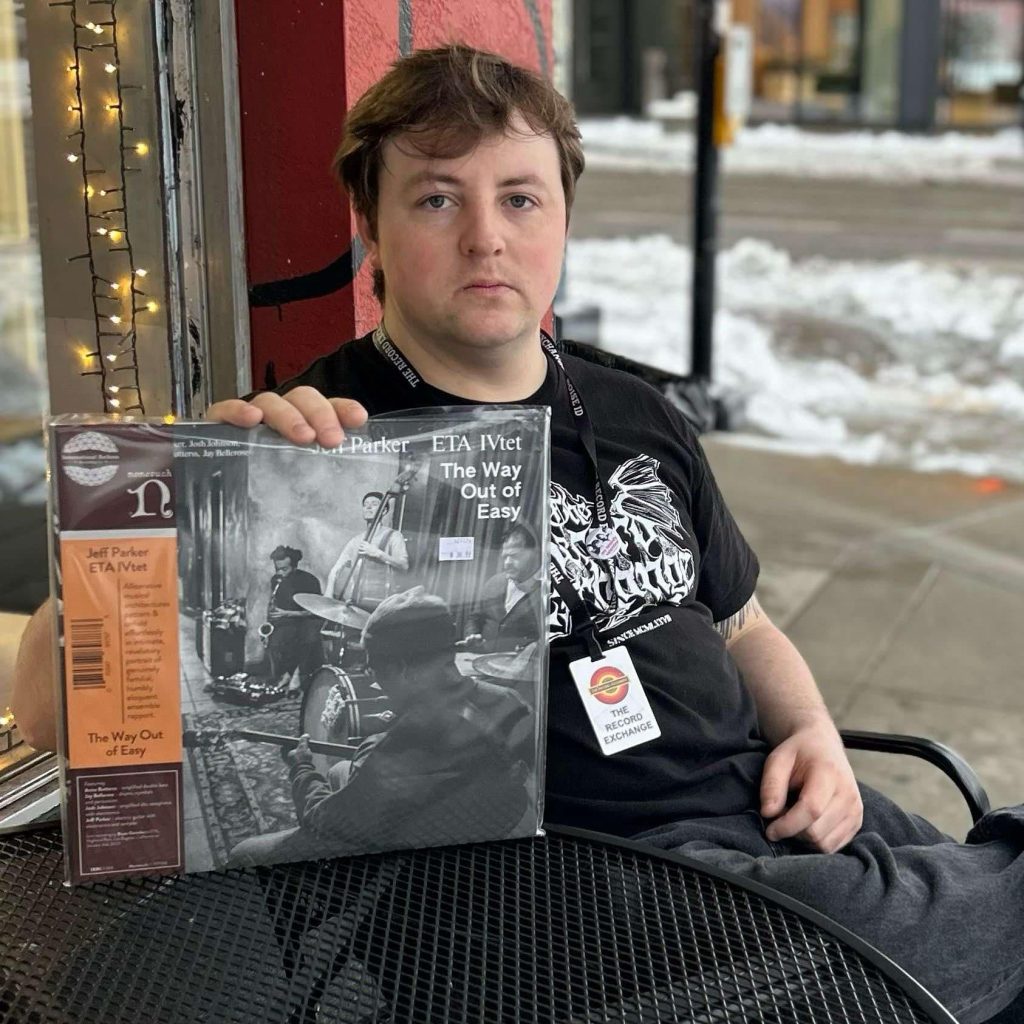Artist: Squid
Album: Cowards
Reviewer: Thomas Metzger
Squid’s music always seems to have a sense of unease, and I think that is one of their strong suits. And can you blame them? In the state of the world today, it’s no surprise that the music coming out of them is so carefully considered. On their newest album Cowards, they pull from real life feelings of anxiety and uncertainty about where our world is headed. A comparison can certainly be made to Radiohead, a band that Squid have cited as “one of the best to ever do it,” according to an AMA (Ask Me Anything) on Reddit. Their new album definitely has moments akin to that of Hail to the Thief or In Rainbows, yet has a more modern feel and timeliness to it, lyrically as well as sonically.
Opener “Crispy Skin” is a tight krautrock drumbeat packed with angular and scratchy math-rock guitar sounds, combined with tinkling synth textures and driving bass lines. The rare drummer/singer Ollie Judge sings about an alternate world of normalized cannibalism, and whether one can resist to participate in a society of evil assimilated within itself. The texture within these tracks also emits a feeling of anxiety: dense, every part thoughtfully considered and well-fit that it’s easy to miss on the surface. Hints of jagged guitar throughout the album give a sort of twitchy feeling, like you feel like you’re being followed. The track “Blood on the Boulders” slowly builds from the quiet into a full-on freakout. Layered vocal lines and guitar parts toward the end of the track give it a heady, dizzying feel until it quickly cuts back to the quiet and unease, sucking you of your air supply in an instant.
“Building 650” sings about being an outsider in an unknown space, undercut by eerie dual-guitar lines and brass horns.“ The character Frank is an evil guy that the protagonist can’t seem to part ways with. “Cro-Magnon Man” has an underlying anger and tenseness to it, like one wrong move and you will awaken the beast within. The title is in reference to the first early humans to settle in Europe after the Ice Age and the idea of the caves they lived in. Bassist Laurie Nankivell says, “Caves are always referred to and explored by psychologists as being representative of our mind, what we repress and what we can’t deal with.”
“Fieldworks I” and “Fieldworks II” are almost a refreshing breath of air in the middle of the bleak reality that Squid have created on this album. A light harpsichord line repeats throughout as Judge sings about being free from “twisted bones.” Once Part II kicks in, we get a taste of somewhat tribal percussion before Judge’s gentle voice serenades over a beautiful guitar melody.
The later half of the album I would describe as more dramatic than the first. “Cowards” starts off with a mesmerizing collage of airy synth tones and brass horn, very Animal Collective-esque. Once the rest of the band kicks in, the scene shifts from what feels like an open field of fresh air, to all of a sudden a sort of slow-motion-style movie death, as the group introduces a light yet dramatic touch of brass horns and strings; very beautiful, and I feel it is the climax of the album. It makes sense reading that this was the first song they wrote for this album, as not only is it the title track, but I feel like the track that best represents the album.
“Showtime!” wakes us back up from the dramatic end to the title track. Jagged slap-back guitar grooves over a hypnotic drum groove, as the band slowly crescendos to an electronic middle section, as the synth arpeggio slowly ramps up in speed, guitar patterns circling around a “Weird Fishes/Arpeggi”-style drum pattern, until we eventually reach the last track “Well Met (Fingers Through the Fence).” If “Cowards” and “Showtime!” were the dramatic peaks of the album, “Well Met” is the closing act, painting an auditory collage over rattling percussion and slinky vocal melodies, almost sung with a childlike whimsy, featuring additional female vocalists. They sing about the mundane repeating cycle of housing and urban development, longing for the “grass between their toes.” It is a satisfying ending to the dramatic montage of sound that Squid delivers on this album.
Overall, Cowards paints a bleak picture of a future where morality is questioned, and we become overwhelmed to the point of hopelessness. I’m not sure if you can call Squid one of the more underrated post-punk bands out right now, but they have certainly become one of my favorites with each passing release. Through their dramatic instrumentation and lyricism, each album seems to expand further into a feeling of general restlessness and suspense, unsure of where society is headed, and Cowards seems to be a well-crafted next chapter in the story.
Favorite tracks: “Crispy Skin,” “Building 650,” “Cro-Magnon Man,” “Cowards”
RIYL: Krautrock, Radiohead, angular guitars, math rock




